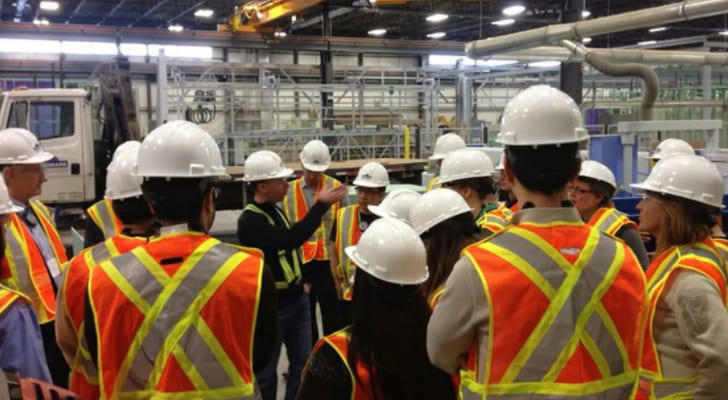The Gospel for Construction Workers: Accessing Free Safety Training Courses
The construction industry offers high earning potential and low entry barriers. Many jobs require no college degree, making it accessible for individuals from diverse backgrounds. As demand for skilled labor grows, workers can secure well-paying positions.
Free safety training courses, such as those offered by NYC Small Business Services (SBS), provide essential safety skills and prepare workers for job site challenges. By removing the financial burden of training, these free courses empower individuals to enhance their employability and launch successful careers in construction.

The Demand for Construction Workers in the U.S.
The construction industry in the United States is experiencing a significant demand for skilled workers. As infrastructure projects expand and new buildings are erected, employers are actively seeking individuals to fill various roles. According to the U.S. Bureau of Labor Statistics, employment in the construction sector is projected to grow by 5% from 2021 to 2031, which is faster than the average for all occupations. This growth translates to numerous job opportunities, making construction an appealing career choice for many.
High Salaries with Low Entry Requirements
One of the most attractive aspects of a career in construction is the potential for high salaries without the necessity of a college degree. Many entry-level positions in construction offer competitive wages, with opportunities for overtime and benefits. For instance, the median annual wage for construction laborers was around $37,000 as of 2021, with experienced workers earning significantly more. Specialized roles, such as electricians and plumbers, can command even higher salaries, often exceeding $60,000 annually.
The Necessity of Safety Training
Given the inherent risks associated with construction work, safety training is not just beneficial; it is essential. Workers must be equipped with the knowledge to identify hazards, use personal protective equipment (PPE), and follow safety protocols to prevent accidents and injuries. In fact, many employers require workers to complete safety training before they can step onto a job site. This training not only protects workers but also helps companies comply with Occupational Safety and Health Administration (OSHA) regulations, reducing liability and promoting a culture of safety.
Benefits of Free Construction Safety Courses
The NYC Small Business Services (SBS) offers free construction safety courses that provide several advantages over traditional safety training programs:
1.Cost Savings: Unlike traditional safety training courses, which can range from $100 to $500, SBS courses are completely free, making safety training accessible for workers and small businesses with limited budgets.
2.Regulatory Compliance: Completing the courses helps workers meet Local Law 196 requirements, ensuring they can work legally on construction sites without incurring additional costs.
3.Enhanced Safety Knowledge: Participants gain essential skills to prevent accidents and injuries, promoting a safer work environment, similar to traditional courses but without the financial burden.
4.Increased Employability: A valid Site Safety Training (SST) card enhances job prospects, as employers prefer candidates with safety training, making SBS courses a valuable asset for job seekers.
5.Support for Small Businesses: Free training allows small construction firms to efficiently train employees without incurring additional costs, which is often a significant barrier for small businesses in traditional training programs.
Prerequisites for Enrolling in the Courses
To enroll in the free construction safety courses offered by SBS, individuals must meet certain prerequisites:
●Age Requirement: Participants must be at least 18 years old to enroll in the training programs.
●Residency: The courses are typically available to New York City residents, ensuring that local workers benefit from the training.
●Commitment to Complete Training: Participants should be prepared to complete the full training program, which includes 40 hours of safety training, covering various essential topics.
●Language Proficiency: Courses are offered in multiple languages, including English, Spanish, Mandarin, and Cantonese, to accommodate diverse participants.
Career Opportunities After Training
Upon completing safety training, workers can pursue a variety of roles within the construction industry. Common job opportunities include:
●Construction Laborer: Entry-level positions that involve manual labor, assisting skilled tradespeople, and maintaining job site safety.
●Carpenter: Skilled workers who construct, install, and repair structures made of wood and other materials.
●Electrician: Professionals who install and maintain electrical systems, requiring additional training and certification.
●Plumber: Specialists in installing and repairing piping systems, also requiring specific training and licensing.
●Safety Coordinator: Individuals responsible for overseeing safety protocols on job sites, ensuring compliance with regulations, and conducting safety training for other workers.
Conclusion
The construction industry offers a wealth of opportunities for those seeking high-paying jobs with minimal entry requirements. With the increasing demand for skilled workers, safety training becomes a vital step in securing employment and ensuring a safe work environment. By taking advantage of free or low-cost safety training programs, such as those offered by the NYC Small Business Services, aspiring construction workers can enhance their employability and embark on a rewarding career path in this dynamic field. The benefits of SBS's free courses, particularly in terms of cost savings and accessibility, make them an invaluable resource for both workers and small businesses in the construction industry.
